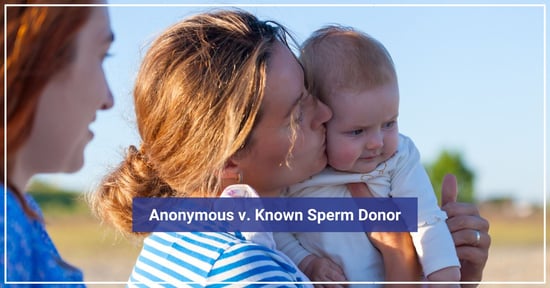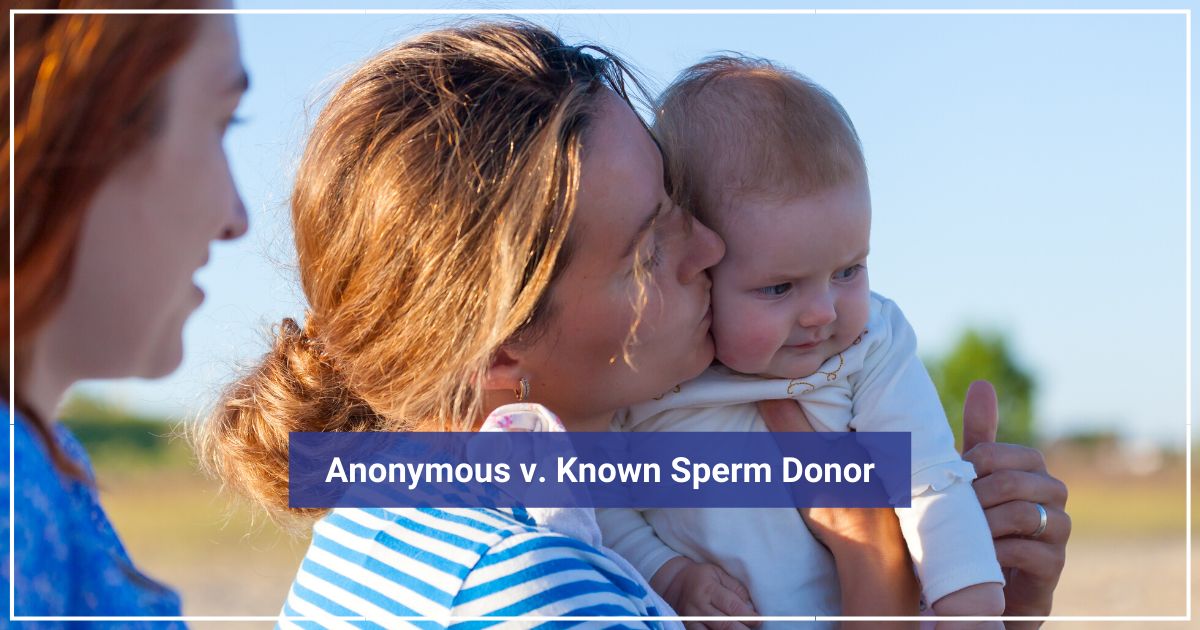Ask The Expert: Choosing between an Anonymous v. Known Sperm Donor
January 30th, 2020 | 5 min. read
By Lisa Schuman

One of the biggest questions that we receive from LGBTQ couples and single parents-to-be using biological family methods is that of donor choice. Should I ask a friend to be my egg or sperm donor? How do I talk to my future child about their conception story, when it involves a donor?
Each individual or couple who is hoping to use a donor as part of their family building should meet with a counselor, to discuss the ins and outs of the decision. We're lucky to have a team of experts in our Gay Parents To Be network, including two social workers who meet regularly with both intended parents and also potential donors! In the blog below, Lisa Schuman, licensed clinical social worker (LCSW), answers a question about whether a same-sex female couple should use an anonymous or known sperm donor.
Do you have your own family building question that you want to ask our LGBT family building team? Leave us a comment below.
Planning Ahead? Choosing between an Anonymous vs Known Sperm Donor
Hi Lisa,
My wife and I have dreamt about having children since we met in high school. We felt like we did all our homework about what it would take. We took all the right steps. We got married. We thought about how we wanted to build our family. We found the right fertility clinic. We decided that she would carry first and I would carry second (since I'm younger) and we are using a good sperm bank.
But now we’re stuck on whether or not to use a sperm donor who would be willing to be contacted when our future child is 18 or to use a completely anonymous donor. The truth is we want to give our future child the gift of being able to contact his or her donor but we aren't in love with any of the open donors we have found and really like a donor we found who is anonymous. We thought doing our due diligence would help us find all the answers but now we’re stumped. Can you give us some
advice?
Cassie
Dear Cassie,
Congrats on your decision to move forward with family building! When it comes to choosing a sperm donor, the most important consideration comes when deciding between an anonymous vs. known sperm donor. With that in mind, I want to offer you a few words of encouragement for your journey ahead, as well as several resources that can help you decide on the right sperm donor for you and your family.
First, let yourself off the hook about thinking that you have to have the perfect plan. It’s wonderful that you want to give your child the gift of being able to find their donor one day. However, it does not always work out the way we plan. Sometimes, even sperm donors who say their identity can be released when the child is 18 (also known as open-door donors) change their minds. For example, when the first few children contact him, he may be very happy to meet, talk and share his history. But when this donor is older, has a family of his own, and perhaps has met multiple offspring already, he may not be as enthusiastic. DNA programs such as 23 and Me and Ancestry.com make it almost impossible to be anonymous, so it is likely your child will find their donor if they are interested. The one benefit to choosing a donor that is willing to be contacted is that he once said he would be open, therefore, there is a better chance he will be willing to connect, but again, there is no guarantee. If you find the right donor for you and he is labeled anonymous, you can always tell your child you made the best decision you could to give them the healthiest life possible, and unfortunately, the best donor was not willing to be contacted.
Thinking through the sperm donor selection process can be confusing and our counselors are here to help you. For now, you can begin by thinking about two important issues, psychological screening, and inheritance. Not all sperm banks thoroughly screen their donors for psychopathology. Many sperm banks only began screening donors according to the guidelines set forth by the American Society for Reproductive Medicine in 2017. Make sure you check with your sperm bank to ensure your donor has been properly screened. This screening includes a psychological test (the PAI or MMPI are the most respected tests in the industry), and a psychological interview with a qualified mental health professional. Please note that a psychological profile is not the same as the detailed screening outlined above.
Next, consider the traits that the genetically linked parent has in common with the donor. If you and your partner were able to have a child together as a couple, you would. Unfortunately, science is not there yet. In the meantime, you can look at your donor’s genetic pool and make sure the difficulties that have inflicted his family are not the same as the problems you have in your family. Everyone dies of something, but if you have a history of colon cancer in your family, you don’t want colon cancer to be part of your donor’s family history as well. While you may like the donor, you are also inheriting his genetic pool and you do not want to double your child’s risk for a major disease. Once you have done this, you can look at his genetic pool for characteristics you would not like to inherit, in the event that things like asthma or poor vision run in your family as well.
Last, remember that you are also taking on the physical traits of the donor’s family. For example, I met with a donor who was blonde, but had three red-haired brothers. If you are interested in fair skin, tall stature, dark hair etc., make sure your donor is not the only family member who has that trait. Look at the overall picture on both sides of his family.
It is not possible to be certain that your child will be able to contact your donor or that your child will have your musical talent or athleticism. Therefore, it is important to focus on choices that may stack the odds in your child’s favor for good physical and psychological health. After that, choose the donor you like best so you will feel good when you speak about him to your child. Almost everything else is out of our control. Then again, much of parenthood is like that anyway. We focus on what’s important and let a lot of the not so important things go. So imagine this exercise as a step towards parenthood.
Best wishes on your journey,
Lisa
Lisa Schuman, LCSW is a psychotherapist who has been counseling individuals, couples and groups on a variety of issues and has specialized in reproductive medicine for over a decade.

